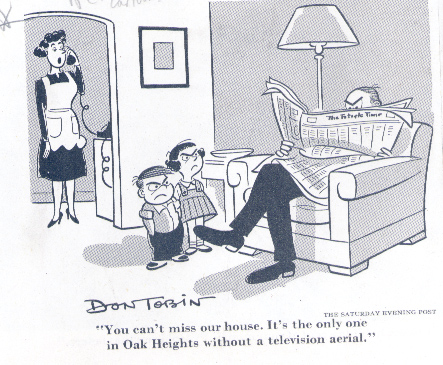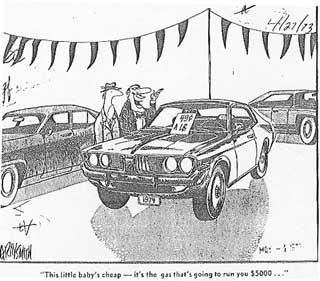In 1948, Dr. Jules Labarthe Jr., a senior fellow at Carnegie Mellon University from the Papers of the American Association of Textile Technologists, described a consumer as " one who uses goods and so diminishes or destroys their utilities". Often a distinction was made between the ultimate consumer [who used up the product] and the producer [who used up the raw materials needed to make the product].
Activity
Working in pairs or small groups, develop a list of things that you "consumed" or used up in the last 24 hours. Use these lists to have a class discussion about needs and wants. Which of these items are a necessity and which are necessary items and why?
The American consumer has not always been seen as very intelligent. Read the two descriptions of consumers in the early 1960s. These articles come from bulletins of the Better Business Bureau and were published in the early 1960's. The first was titled the "Irresponsible Consumer" and the second was the " Idiot Consumer". Make a list of 10 characteristics of the consumer of the 1960's and then make your own list of the characteristics of the modern consumer. Compare both lists and develop generalizations about each list.

The Irresponsible Consumer and the Idiot Consumer
- He believes a contract is a one way street, binding in the businessman, but not on the customer.
- She believes the right to change her mind is unalienable and that regardless of inconvenience, time or cost, a business firm must refund money on a whim.
- He feels a service charge is an insult to his pocket book.
- She dreams up imaginary defects in an effort to back out of a deal.
- He tries to connive on auto repairs so that the "deductible" charge is padded into the repair bill.
- He expects appraisals and estimates, which take the time of skilled technicians, to be "on the house".
- She thinks nothing of lying about the age and value of a garment damaged in dry cleaning.
- He signs without reading and then complains that someone expects him to live up to it.
- She believes her "money back" is a right, rather then a courtesy extended by a business firm.
- He threatens with law suits, police action, letters to his congressman, and brandishes the better business bureau and though it was his own.

- His bump of vanity is king size and is the magic touchstone for the white-collar bandits, who with a little puffery and flattery, can con him into believing and buying anything.
- He never asks how much it costs to buy it on time, only "how much a month".
- She charges it here, finances it there, never adds up the total tab and wonders why the paycheck never stretches to meet them all.
- He would rather believe a stranger and bite on some get rich quick scheme than listen to the calm and uninteresting judgment of his banker, his lawyer, or what remains of his own common sense.
- He thinks he can buy automobiles, appliances, and dozens of gadgets and then get rich by conning his friends into buying the same things in an endless rainbow of the endless chain.
- He'll sign up for a school thinking it will assure him of a civil service job or berth on the police force without ever checking to see that such commercial promises are bunk and that authoritative training is usually available without charge.
- She believes that she can reduce by taking a pill.
- He believes that his ills can be cured by the promises, the fake machines, the snake oil, or the phony religious faith of some cynical but spellbinding quack.
- He believes that because the suede-shoe slicker told him that his house was a "show house" that he'll get the remodeling job free - and that the notes he signed for financing won't have to be paid.
- They come to a place like the better business bureau - not to get the facts on their investments or purchase- but only hoping that the bureau will flatter them by confirming their own good investment judgment.
- Usually, they come too late, and neither the bureau nor the law can save them from the penalty of their own impulsive folly.